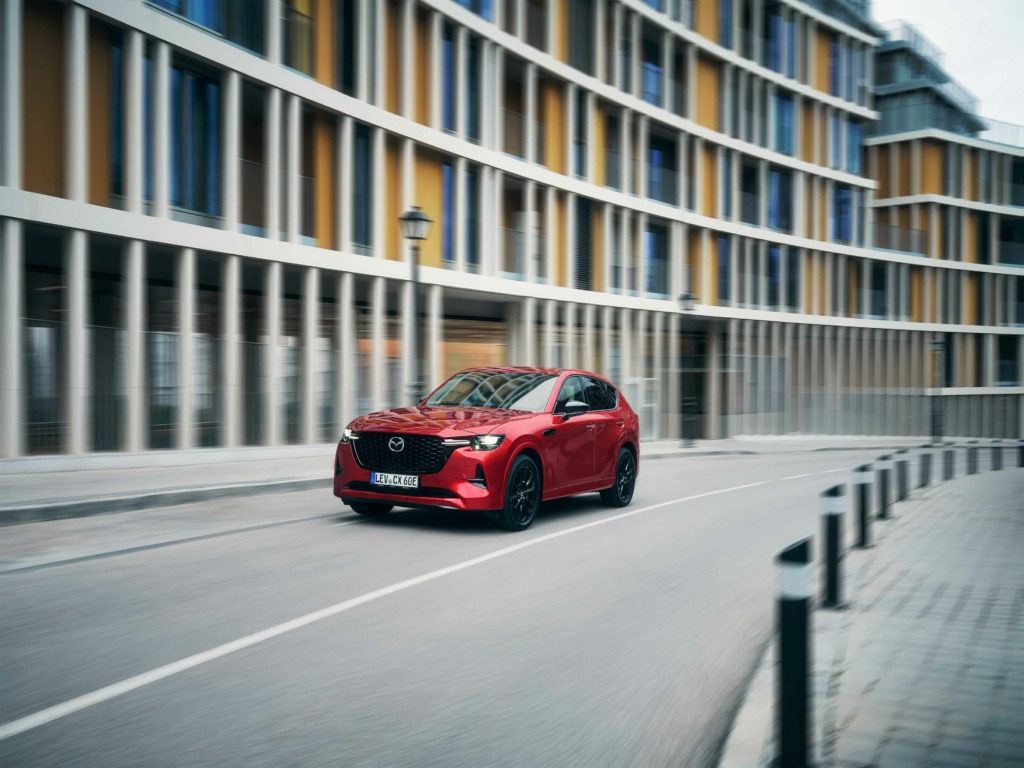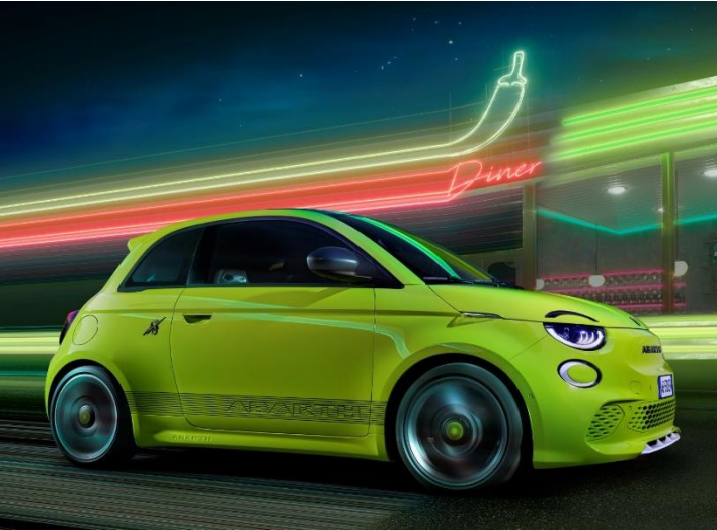The Mazda CX-60 aims to establish Mazda in the premium part of the upper mid-sized SUV segment. In this, it will be aided by sharp driving dynamics, a refreshing and rather classy cabin and the option of a PHEV powertrain. It’s most affordable than obvious rivals, better equipped – and really rather different.
Background
It’s been a very long time since Mazda had any sort of properly large luxury car. The last time it launched one (the Xedos 9 in 1994), it didn’t feel confident that the Mazda badge would be premium enough. There are no such inhibitions here with this CX-60.
It’s an SUV (of course), one of several large models from the brand due imminently. This is a 5-seat crossover aimed at cars like the Audi Q5 and Volvo XC60. A 7-seat version, the CX-80, is planned to follow, which will target cars like the Audi Q7 and the Volvo XC90. Like those models, this Mazda offers plug-in hybrid tech. This is what this CX-60 launched with and will interest the majority of customers. But is this car properly ‘premium’? Let’s find out.
The Mazda CX-60 Driving Experience
Mazda has identified that mid-sized SUVs of this sort are somewhat uninspiring. It was determined that the CX-60 should be better. To that end, Mazda has developed the ‘Kinetic Posture Control’ system from its MX-5 sports roadster to work for this large crossover. This brakes the inside rear wheel when powering through turns, which better manages body control. In this, the set-up’s helped by a low centre of gravity, a sophisticated multi-link rear suspension system and various selectable drive modes.
What about engines? Well most UK customers will want the Plug-in model. The model uses a 2.5-litre four cylinder petrol engine paired with a 100kW electric motor. There’s an 8-speed auto gearbox, 4WD is standard and total output is 327PS. Good enough to power this substantial SUV to 62mph in 5.8s, which for reference is 0.3s faster than a rival BMW X3 xDrive30e. The 17.8kWh battery pack offers a 39 mile driving range.
Want an alternative to a PHEV? Mazda has developed two 48V mild hybrid six cylinder powerplants for this car. There’s a 3.0-litre petrol unit using the company’s clever SPCCI compression-ignition tech for enhanced efficiency. It’s possibly more likely that you’d want the brand’s 3.3-litre diesel, an e-Skyactiv D unit offered with a choice of two power outputs: 200PS with rear-wheel drive and 254PS with Mazda i-Activ AWD (all-wheel drive) system.
Refinement was a key development goal for this diesel unit. The unit features an in-line six-cylinder configuration which produces low vibration due to its characteristic ‘perfect balance’. The engine’s high torque delivery gives the CX-60 diesel a 2,500kg trailer weight towing capacity. As a result of its lightweight construction, this powerplant weighs similar to the 2.2-litre Skyactiv D four-cylinder diesel engine used in the brand’s CX-5 SUV.
The Mazda CX-60 Design and Build
You’d certainly recognise this as a Mazda which might not necessarily be a good thing for this car’s premium aspirations. Particularly as it might be mistaken for the company’s mid-sized CX-5 SUV at first glance. It’s actually quite a lot bigger than one of those, measuring 4,745mm long, 1,890mm wide and 1,675mm high. The styling is heavily influenced by the brand’s 2017 ‘Vision Coupe’ concept, but features a flatter treatment for the front end and, obviously since it’s a crossover, quite a different profile silhouette.
Inside, Mazda’s usual ‘Jinba Ittai’ (‘horse and rider’) driver-focused design philosophy prevails, but here it’s been upgraded with higher quality materials and greater attention to detail. And more technology of course: the 12.3-inch central touchscreen is the largest the brand has ever offered. As usual for the class, there’s comfortable space for two adults in the back. And a decent-sized boot that isn’t too impeded by the battery pack on the Plug-in version. It’s 477-litres in size (570-litres including the under-floor compartment); fold the rear bench and you can extend capacity to 1,726-litres. If you need third row seating, you’ll need to ask your dealer about the forthcoming 7-seat CX-80 version.
The Mazda CX-60 Market and Model
The CX-60 PHEV variant is offered in the UK in three highly specified trim grades.
- ‘Exclusive-Line’ (priced from around £45,500)
- ‘Homura’ (priced from around £48,000)
- ‘Takumi’ (priced from around £49,500).
If you’d prefer the 3.3-litre mild hybrid diesel model, prices start from around £43,000 for the 200PS model with base ‘Exclusive-Line’ trim and rear wheel drive. You can also have a CX-60 diesel with the same ‘Exclusive-Line’ trim and AWD. Plus a higher-output 254PS engine, priced from just over £45,500 – or from just under £51,000 in top ‘Takumi’ trim.
Across the range, customer choice is further enhanced with the ability to add two option packs. The ‘Convenience Pack’ and the ‘Driver Assistance Pack’, with a further ‘Comfort Pack’ available with base ‘Exclusive-Line’ trim. There’s the additional option to specify a Panoramic roof on ‘Homura’ and ‘Takumi’ models. To give you some class perspective, rival Lexus NX 450+ and BMW X3 xDrive30e models start at around £50,000.
You get more equipment with the CX-60 too. The mid-range ‘Homura’ variant most UK customers are expected to want is visually distinguished from the base ‘Exclusive-Line’ version by body coloured wheel arch mouldings and a dark plated signature wing grille surround. Plus gloss black mirrors and honeycomb grille treatment, while 20-inch black alloy wheels finish the exterior look.
Inside, the ‘Homura’ grade features seat heating for the outer rear seats and ambient lighting. Plus it’s equipped with the Mazda Driver Personalisation System that will recognise the occupant of the driver’s seat via facial recognition and automatically adjust the surroundings. Top ‘Takumi’-spec gets you 20-inch black machined alloy wheels and body-coloured mirrors, combined with chrome plated signature wing grille treatment and side window surrounds. While the gloss black bar type radiator grille design is another feature unique to this flagship grade.
The Cost if Owning a Mazda CX-60
The CO2 efficiency figures for the PHEV version are rated between 33 and 37g/km, which entitles owners to a low 12% Benefit-in-Kind tax banding. That means a lower monthly tax liability too of course, rated for base ‘Exclusive’ trim at £88 for 20% tax payers and £176 for 40% tax payers. The combined cycle fuel figure – 188.3mpg – is as real world-irrelevant as it is with any other PHEV. If you don’t regularly plug the thing in, you’ll just be driving about in quite a heavy petrol-powered SUV.
If you make use of the 37 mile all-electric driving range, then you can expect this car to be about as frugal as a good SUV diesel in this class. And of course, it’ll be a lot cheaper to tax, as we said earlier. Charging time from a 7kW garage wallbox should be about two and a half hours. There’s no option to get a three-phase 11kW charger or a DC charger.
As for the diesel, well the 200PS engine returns a WLTP average fuel consumption of 56.5mpg, with CO2 emissions of 129g/km in rear-wheel drive ‘Exclusive-Line’ guise. While the AWD 254PS diesel model’s average fuel consumption is 53.3mpg, with CO2 emissions from 137g/km.
We should additionally mention the warranty, the usual unremarkable Mazda three year / 60,000 mile package. You can manage maintenance with a useful ‘My Mazda App’, which can give you reminders about servicing. You can also book your car in at your local dealership and access a digitally-stored record of the model’s service history.
Summary
Whether customers in this segment will view the Mazda badge on this model as being properly ‘premium’, it’s difficult to say. As far as we’re concerned, the car itself certainly is, in every way that really matters. The cabin’s beautifully finished and refreshingly different from anything else in the segment. Mazda’s put some effort into making this CX-60 more engaging to drive than most of its rivals. Most notably with its ‘Kinetic Posture Control’ system.
On top of all of this, it’ll count significantly in this Mazda’s favour that it’s considerably more affordable than its more established premium segment mid-sized SUV rivals. Particularly in the PHEV form that most customers here will want. It’ll be a pity if all of this worthy effort is shipwrecked on the rocks of badge snobbery. The CX-60 deserves better. If you are interested in the Mazda CX-60 enquire now.





